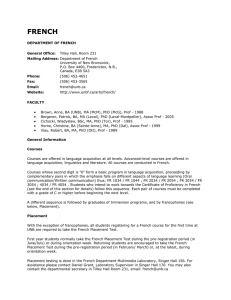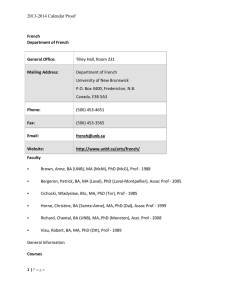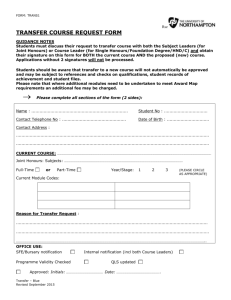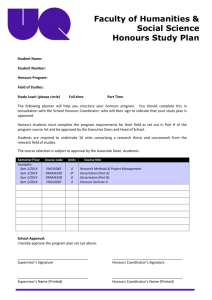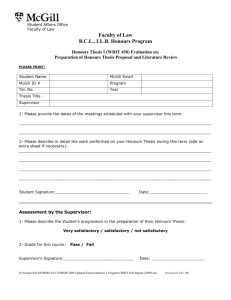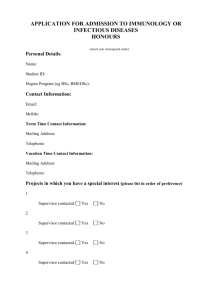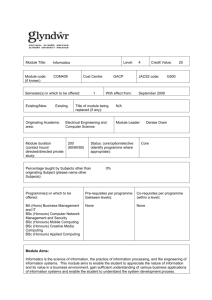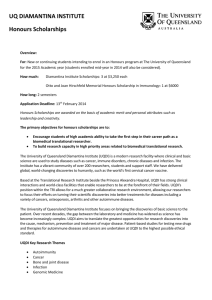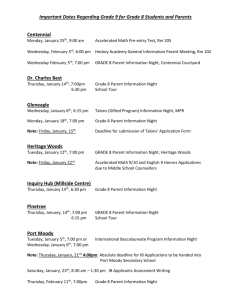French - University of New Brunswick
advertisement
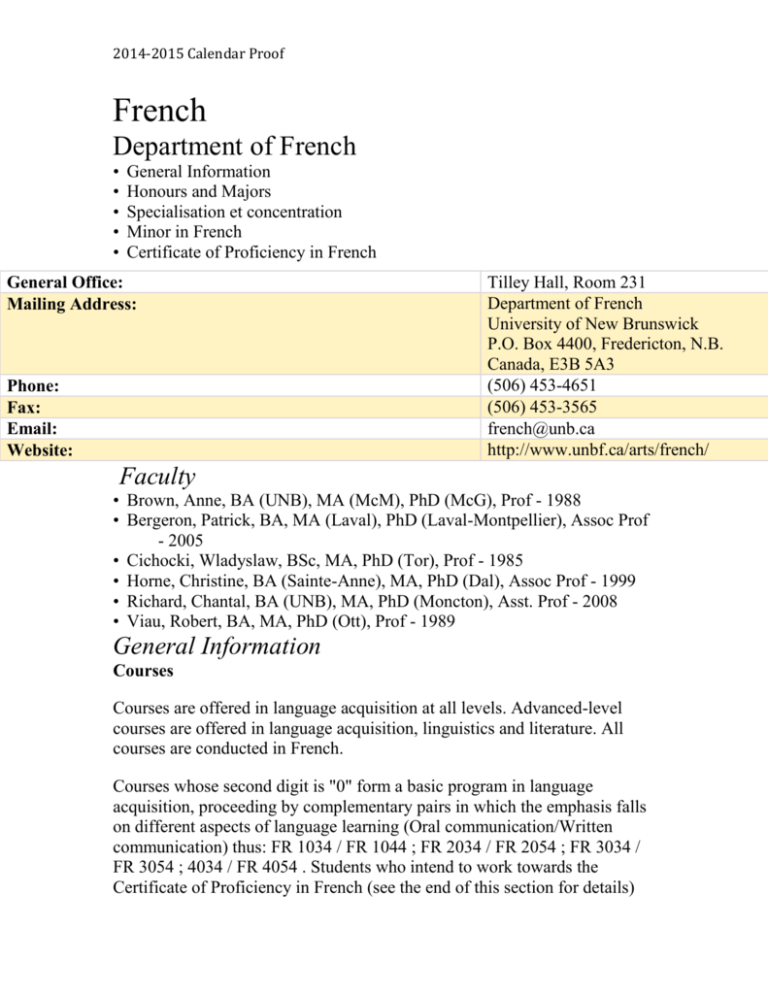
2014-2015 Calendar Proof French Department of French • • • • • General Information Honours and Majors Specialisation et concentration Minor in French Certificate of Proficiency in French General Office: Mailing Address: Phone: Fax: Email: Website: Tilley Hall, Room 231 Department of French University of New Brunswick P.O. Box 4400, Fredericton, N.B. Canada, E3B 5A3 (506) 453-4651 (506) 453-3565 french@unb.ca http://www.unbf.ca/arts/french/ Faculty • Brown, Anne, BA (UNB), MA (McM), PhD (McG), Prof - 1988 • Bergeron, Patrick, BA, MA (Laval), PhD (Laval-Montpellier), Assoc Prof - 2005 • Cichocki, Wladyslaw, BSc, MA, PhD (Tor), Prof - 1985 • Horne, Christine, BA (Sainte-Anne), MA, PhD (Dal), Assoc Prof - 1999 • Richard, Chantal, BA (UNB), MA, PhD (Moncton), Asst. Prof - 2008 • Viau, Robert, BA, MA, PhD (Ott), Prof - 1989 General Information Courses Courses are offered in language acquisition at all levels. Advanced-level courses are offered in language acquisition, linguistics and literature. All courses are conducted in French. Courses whose second digit is "0" form a basic program in language acquisition, proceeding by complementary pairs in which the emphasis falls on different aspects of language learning (Oral communication/Written communication) thus: FR 1034 / FR 1044 ; FR 2034 / FR 2054 ; FR 3034 / FR 3054 ; 4034 / FR 4054 . Students who intend to work towards the Certificate of Proficiency in French (see the end of this section for details) 2 [Type text] follow this sequence. Each pair of courses must be completed with a grade of C or higher before beginning the next level. A different sequence is followed by graduates of Immersion programs, and by francophones (see below, Placement). Placement With the exception of francophones, all students registering for a French course for the first time at UNB are required to take the French Placement Test. First year students normally take the French Placement Test during the preregistration period (in June/July) or during orientation week. Returning students are encouraged to take the French Placement Test during the preregistration period (in February/ March) or, at the latest, during orientation week. Placement testing is done in the French Department Multimedia Laboratory, Singer Hall 156. For assistance please contact Daniel Grant, Laboratory Supervisor in Singer Hall 170. You may also contact the departmental secretary in Tilley Hall Room 231, email: french@unb.ca The French Placement Test must be completed no later than the end of the first week of classes in September, for the fall semester, and at the end of the first week of classes in January, for the winter semester. The Department of French cannot guarantee a place in a course until the testing is completed, and reserves the right to remove from the class lists or wait lists students who have not taken the French Placement Test, or who missed three consecutive class hours within the first two weeks of classes. Students' test results will be a main factor in determining which courses they will be advised to take. Normally students who did not complete Grade XII French will register in FR 1014 (formerly FR 1324), followed by FR 1015 (formerly FR 1325) then in FR 1024 (formerly FR 1334). These courses prepare the student for entry into FR 1034 . Anglophone and other non-francophone students who did complete Grade XII (core) will register in FR 1034 . Advanced placement will be determined by testing. Credit is not given for the courses bypassed by advanced placement, unless the student took an equivalent course for credit at another institution. High school courses cannot be counted for university credit. 2014-2015 Calendar Proof Anglophone and other non-francophone students who have graduated from a French Immersion program are placed in FR 1184 , followed by FR 1194 . Francophones are placed in FR 1124 or FR 2154 when FR 1124 is not offered, followed by FR 2164 , FR 2174 or FR 2184 . Any of these pairs are followed by advanced-level courses. External Credit Students may elect to take language courses off campus, e.g. in summer school. These courses can be counted for UNB credit only if prior authorization has been obtained from the Department, and only if the Department judges that sufficient progress has been made to merit credit equivalent to a course offered by the Department. Prior authorization can be sought by completing a form available from the departmental office. The student is responsible for providing a detailed description of the course and any other information the Department may require in order to assess it. Retroactive approval of courses not taken at UNB will be granted only in special cases. (This condition does not apply to first-year students who wish credit for a course taken before they enrolled at UNB.) Normally a maximum of 9 External credits at the advanced level will be counted towards the Majors and Honours Programs. Advanced-Level Courses (first digits 3 or 4) In order to register for any advanced-level course, a student must be able to demonstrate a competence in French equivalent or superior to that normally attained by the successful completion (C or higher) of FR 2054. Advanced-level courses are of three kinds: language acquisition (second digit 0), specialized courses in linguistics (2, 3, 4), and specialized courses in literature (5, 6, 8). Students honouring or majoring in French are required to choose a number of specialized courses. Students honouring or majoring in another discipline who wish to continue the study of French may take any advanced-level French course, provided they have the necessary competence. Language Acquisition Language acquisition courses ( FR 3034 , FR 3044, FR 3054 , FR 3064 , FR 3204 , FR 4034 , FR 4054 ). FR 3054 is the prerequisite for FR 4034 / FR 4 [Type text] 4054 . Students who already have credit for FR 3034 / FR 3054 may take other Advanced Language classes, such as FR 3044 or FR 3204 , or they may proceed directly to FR 4034 . Francophone students may not take FR 3034 or FR 4034 ; Immersion graduates may not take FR 3034. Linguistics Linguistics ( FR 3404 , FR 3414 , FR 3424 , 3444 , FR 3454 , FR 3464 , FR 3484 , FR 3494 , FR 4414 , FR 4444 , FR 4464, FR 4465 ). FR 3404 is a prerequisite for FR 3424 , FR 3444 , FR 3454 , FR 3464 , FR 4464 and FR 4465. Literature Literature courses are of three kinds: a. courses offering a variety of critical approaches, not limited to France or Canada (second digit 5); b. term-courses in various periods of French European literature (second digit 6); c. term-courses in aspected of French Canadian literature (second digit 8). Check the time-table to see which courses are being offered in the current session. Fuller descriptions of the courses which are being taught are available from the departmental office. Courses listed here under (b) and (c) may be taken by junior and senior level students. In each course a period of literature will be studied, the principal focus being on a small number of prescribed texts. Honours and Majors Option A In option A, students must declare their field of specialization: Linguistics or Literature. All Single and Joint Honours students must complete a required number of ch in advanced-level courses in French with a grade of B or better. All Single and Double Major students must complete a required number of ch in advanced-level courses in French with a grade of C or better. Single Honours: 42 ch Single Major: 36 ch Joint Honours and Double 2014-2015 Calendar Proof Major: 30 ch The required courses are of three kinds: a. a core program of 6 ch composed of FR3404 and one advanced-level literature course. In addition to this, Single Honours students are required to take FR 4902 Honours Report (6ch). b. 12 ch in the student's field of specialization. Honours students (Single and Joint) are required to take 15 ch in their declared area of specialization. c. a required number of ch in other advanced-level courses, determined according to a student's program. Single Honours: 15 ch Joint Honours: 9 ch Single Major: 18 ch Double Major: 12 ch The required courses are of three kinds: a. a core program of 6 ch composed of FR3404 and one advanced-level literature course. In addition to this, Single Honours students are required to take FR 4902 Honours Report (6ch). b. 12 ch in the student's field of specialization. Honours students (Single and Joint) are required to take 15 ch in their declared area of specialization. c. a required number of ch in other advanced-level courses, determined according to a student's program. Single Honours: 15 ch Joint Honours: 9 ch Single Major: 18 ch Double Major: 12 ch The minimum number of required credit hours is as follows: Single Honours: 6 (a) + 15 (b) + 18 (c) + FR4902 = 42 ch Joint Honours: 6 (a) + 15 (b) + 9 (c) = 30 ch Single Major: 6 (a) + 12 (b) + 18 (c) = 36 ch Double Major: 6 (a) + 12 (b) + 12 (C) = 30 ch Option B In option B, all Single and Joint Honours students must complete the required number of credits by taking any advanced level course in French and obtain a grade of B or better in each course. All Single and Double Major students must complete the required number of credits in advancedlevel courses in French with a grade of C or better. Francophone students may not take FR 3034 or FR 4034 . Immersion students may not take FR 3034 . 6 [Type text] Single Honours: 42 ch Single Major: 36 ch Joint Honours and Double Major: 30 ch Spécialisation et concentration Option A Les candidat.e.s doivent choisir un domaine d’étude : la linguistique ou la littérature. Le nombre de crédits à accumuler est déterminé selon le programme. Les candidat.e.s à une spécialisation ou à une double spécialisation doivent obtenir une note finale de B ou mieux pour chaque cours de niveau avancé en études françaises. Spécialisation: 42 cr Concentration: 36 cr Double spécialisation ou double concentration: 30 cr Le cours requis sont de trois types: a. un tronc commun totalisant 6 cr, composé de FR3404 et d'un cours de littérature de niveau avancé. En plus de ces cours, les candidat-e-s à la spécialisation simple doivent suivre FR 4902 Mémoire de spécialisation (6 cr). b. 12 cr au sein de l'option choisie (les candidat-e-s à la spécialisation, simple ou double, sont tenus d'obtenir 15 cr dans leur option); c. des cours complémentaires libres de niveau avancé totalisant un nombre de crédits déterminé selon le programme. Spécialisation simple: 15 cr Double spécialisation: 9 cr Concentration: 18 cr Double concentration: 12 cr Le nombre minimum de crédits est fixé comme suit : Spécialisation simple: 12 (a) + 15 (b) + 15 (c) = 42 cr Double spécialisation: 6 (a) + 15 (b) + 9 (c) = 30 cr Concentration: 6 (a) + 12 (b) + 18 (c) = 36 cr Double concentration: 6 (a) + 12 (b) + 12 (c) = 30 cr Option B Les candidat.e.s à la spécialisation ou à la double spécialisation doivent compléter un nombre requis de crédits en suivant des cours de niveau avancé en études françaises et obtenir une note finale de B ou mieux. Les 2014-2015 Calendar Proof candidat.e.s à la concentration ou à la double concentration doivent compléter un nombre requis de crédits en suivant des cours de niveau avancé en études françaises et obtenir une note finale de C ou mieux. Le FR 3034 et le FR 4034 sont fermés aux étudiants.e.s scolarisé.e.s en français. Le FR 3034 est fermé aux diplômé.e.s des programmes d’immersion. Spécialisation: 42 cr Concentration: 36 cr Double spécialisation ou double concentration: 30 cr Minor in French Students who are doing a minor are required to complete 24 credit hours in French with a minimum of 12 credit hours at the advanced level, 3 of which will be in literature or linguistics. A grade of C or better is required in all courses. The program to be followed will depend on the background of the student. Students who have completed grade 12 French second language will normally take FR 1034 / FR 1044 / FR 2034 / FR 2054 and 12 additional credit hours of advanced level courses, 3 of which will be in literature or linguistics. Students from immersion programs will take FR 1184 / FR 1194 / FR 2154 / FR 2164 , and 12 credit hours of advanced level courses, 3 of which will be in literature or linguistics. ( FR 3034 is excluded). Francophones will take FR 1124 or FR 2154 , followed by either FR 2164 , FR 2174 or FR 2184 , and 18 credit hours of advanced level courses, 3 of which will be in literature or linguistics. ( FR 3034 and FR 4034 are excluded). At the advanced level, students can choose from language, literature, and linguistics courses. Certificate of Proficiency in French Students who are not majoring or honouring in French and who are not native speakers of French but who would like to have official recognition of their competence in French as a second language may apply for admission to this program. It is administered for the University by the Department of French on the Fredericton campus and by the Department of Humanities and Languages on the Saint John campus. The goal of the program is to enable students to acquire a functional 8 [Type text] command of French by upgrading the four basic language skills over a fouryear period. The program normally consists of 12 ch of French courses at the Introductory and Intermediate levels, followed by 12 ch at the Advanced level. These will normally be FR 3200 and FR 4200 (Saint John); FR 3034 , FR 3054 , FR 4034 , FR 4054 (Fredericton). In all of these courses the student is to attain a mark of C or higher, and the certificate is awarded on the basis of a comprehensive examination upon termination of the last course in the sequence. Students who have received advanced standing for Introductory level French need take only three full-year courses (18 ch) to qualify for the comprehensive examination. A maximum of six credit hours may be transferred from another program. Students interested in being considered for the certificate must seek the approval of the appropriate academic unit, and should register for the program at the beginning of the sequence, or at their earliest convenience. The normal rules governing acceptance to the courses apply; they will be found in the section of the Calendar dealing with the two administrative units concerned. In order to be admitted to the program, students must have Grade 12 French or its equivalent. Full-time students may take these courses as part of their undergraduate program. Persons not working towards a degree may enrol for the courses as part-time students. Students must sit the comprehensive examination within two years of completing the course requirements. Students who fail the comprehensive examination on their first attempt will be allowed to sit again in the following session. The Certificate of Proficiency in French will be awarded by the University through the Registrar's Office. The student's transcript will bear a separate entry showing that the certificate has been awarded and recording the grades obtained in the four areas of language competence (speaking, listening comprehension, reading comprehension and writing). Speaking: A: the candidate participates with ease in conversation B: the candidate can participate adequately in conversation albeit with a certain degree of hesitancy C: the candidate can make himself or herself understood in conversation 2014-2015 Calendar Proof Listening Comprehension: A: can understand lectures in a job-related context, and radio and TV news and programs B: can understand lectures on non-technical subjects and group conversations C: can understand what is said to him or her in individual conversation with one other person Reading Comprehension: A: can understand the main ideas in books, magazines and newspapers without the aid of a dictionary B: can read printed material of personal interest with occasional help from a dictionary C: can read, with the aid of a dictionary, standard texts written without stylistic difficulties on subjects within his or her interest. Writing: A: can write papers, essays, etc., which are acceptable in form and format B: can write résumés, letters, short compositions which are structurally acceptable but which would need some revision C: can write sentences and short paragraphs which are grammatically acceptable Full details are contained in a brochure obtainable from the Department of French on the Fredericton campus and the Department of Humanities and Languages on the Saint John campus.
